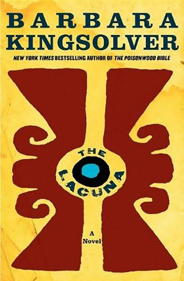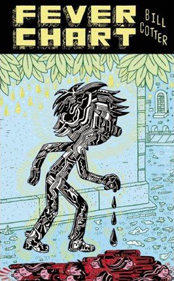-
March 11, 2010
Opening Round
-
Commentary by
Kevin Guilfoile & John Warner
-
Today’s Winner:
1The Lacuna
John: Judge Chee declares of Fever Chart and its (admittedly) shambling structure that when it comes to assessing its overall quality, “some readers will be more forgiving than me.”
I am that reader. I loved Fever Chart. I thought it was, as the kids were saying back in 1932, “a hoot.” The book had more laughs per line than any I’ve read since Sam Lipsyte’s Home Land, and more entertainingly eccentric characters than the USA Network primetime lineup, without or even with Monk. By the time the middle section of the book arrived with perhaps some extra flab around the waistline story-wise, I didn’t care, because I didn’t have any interest in this particular book ending because I was more than happy to listen to Jerome Coe ad infinitum.
Of course, there’s other factors weighing in Fever Chart’s favor, the kinds of things that make us predisposed to enter into the text with a positive attitude that invariably colors our initial response as we give the book a few pages to see if it’s a love match. The book is published by McSweeney’s, whom I work for, and while I have nothing to do with the products issued by the print arm, for me as a reader, they’ve had an excellent track record in the past. It’s safe to say, I wanted to like the book, and some of that wanting may inevitably have colored my response.
Regardless of all that, the book is awesome.
Kevin: I started reading Fever Chart as a pdf. That was unwieldy, so I went to the bookstore and I was really struck by how my impression of the book changed just by holding it in my hands. McSweeney’s has always put more thought (and money) into the design of its books than almost any other publisher, but Fever Chart is an especially beautiful object, with a wonderful, textured, hardcover binding and a stunning color illustration on the die-cut jacket. You simply can’t argue that reading an electronic version of Fever Chart is equivalent to holding the actual thing. (Whether or not it makes economic sense to produce such a book is another matter, of course.)
When Fever Chart is funny, which is often, I loved it. There are some sequences, which you and Judge Chee have pointed out, where the story seems to lose its comic sensibilities and is more interested in ferrying you (and the characters) to the next set piece, but maintaining a comic sensibility over 300 pages is one of the hardest things a novelist can attempt. You can’t penalize a writer too much for not landing the equivalent of a quintuple toe loop every time. Cotter is a terrific and interesting writer.
John: The Lacuna and me, on the other hand, felt like a bad match, kind of like Mitt Romney and intellectual consistency. I’d read three Kingsolver novels in the past, liked two, loathed one. I admired her desire to make sure her novels have a “point” even as I resented what I saw as the resoluteness with which that point was pursued. My wife had also read the book before me, and when I asked how she’d liked it, she shrugged, not a particularly ringing endorsement. I’d also seen a few reviews that described the novel as “ambitious” which I read as code for “big, and maybe kind of boring.”
The book is also on the long-ish side, and it was 15th out of 16 on my Tournament reading list, meaning I’d had my reading dictated to me for the previous couple of months, and there was a pile of other books that I’d chosen for myself just waiting to be tackled. Reading The Lacuna began to feel like homework and I resented it and those first 28 pages that Alexander Chee says he’d excise defeated me. The Lacuna remains the only book in this year’s tourney I wasn’t able to read to completion and I’m pretty sure it’s mostly my fault.
I just wasn’t in the mood.
Kevin: The Lacuna is one of the books I didn’t get to, which means only that other books were more accessible to me before I ran out of time. I will say that our longlist was especially packed with historical fiction this year. You and I play only a minor role in determining the books that make it into the tourney, but I know that in the mix of arbitrary considerations determining the final 16, there was a “how many historical novels is too many” discussion. I suspect there was a book or two that might have made it in except for the subject matter.
John: Arguably, our first three matchups have pitted historical versus contemporary novels (though maybe Let the Great World Spin is set recently enough to not qualify, I’m not versed on the definitions—help me out commenters) and history has won over the present every time. Tomorrow and Monday we’ve got two more in Burnt Shadows and Wolf Hall, with The Book of Night Women laying in wait for Lorrie Moore next Wednesday. Last year’s Tournament was won by a historical novel, Toni Morrison’s A Mercy.
If I was a hack journalist, I’d be polishing my pens in order to write my trend piece.
Kevin: Looking at the rankings in our personal confidence pool, each of us thought Fever Chart might pull off the upset, but I ranked The Lacuna a little bit higher than you did. So after three rounds I extend my lead just slightly, 33-27.
Mmmm. I can already smell the cheese.
Kevin Guilfoile is a contributing writer for TMN. His debut novel, Cast of Shadows, has been translated into more than 17 languages, and his second novel, The Thousand, will be published in August 2010 by Alfred A. Knopf.
John Warner is a contributing writer for TMN. He is the author of Fondling Your Muse: Infallible Advice From a Published Author to the Writerly Aspirant. He teaches at Clemson University.

















